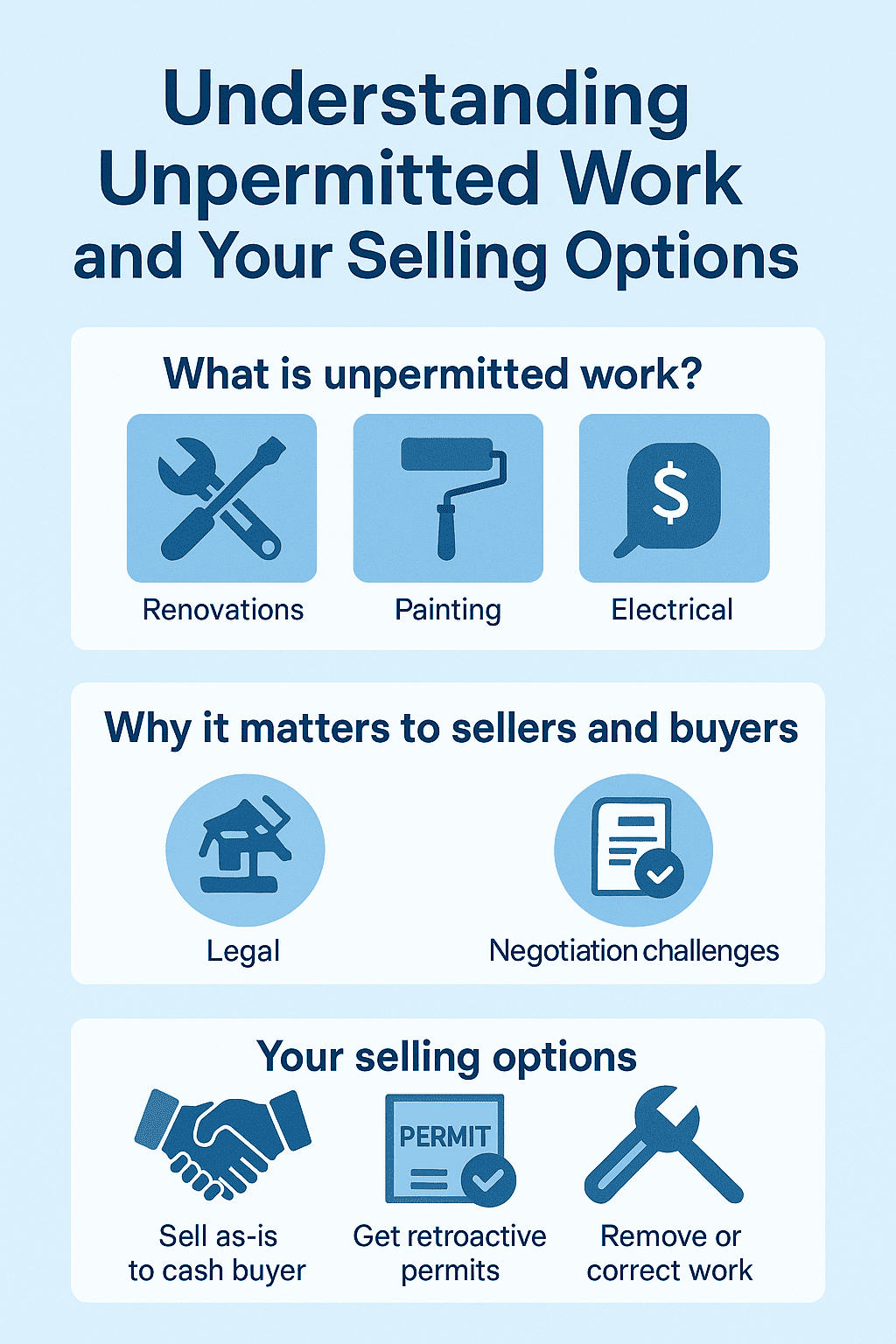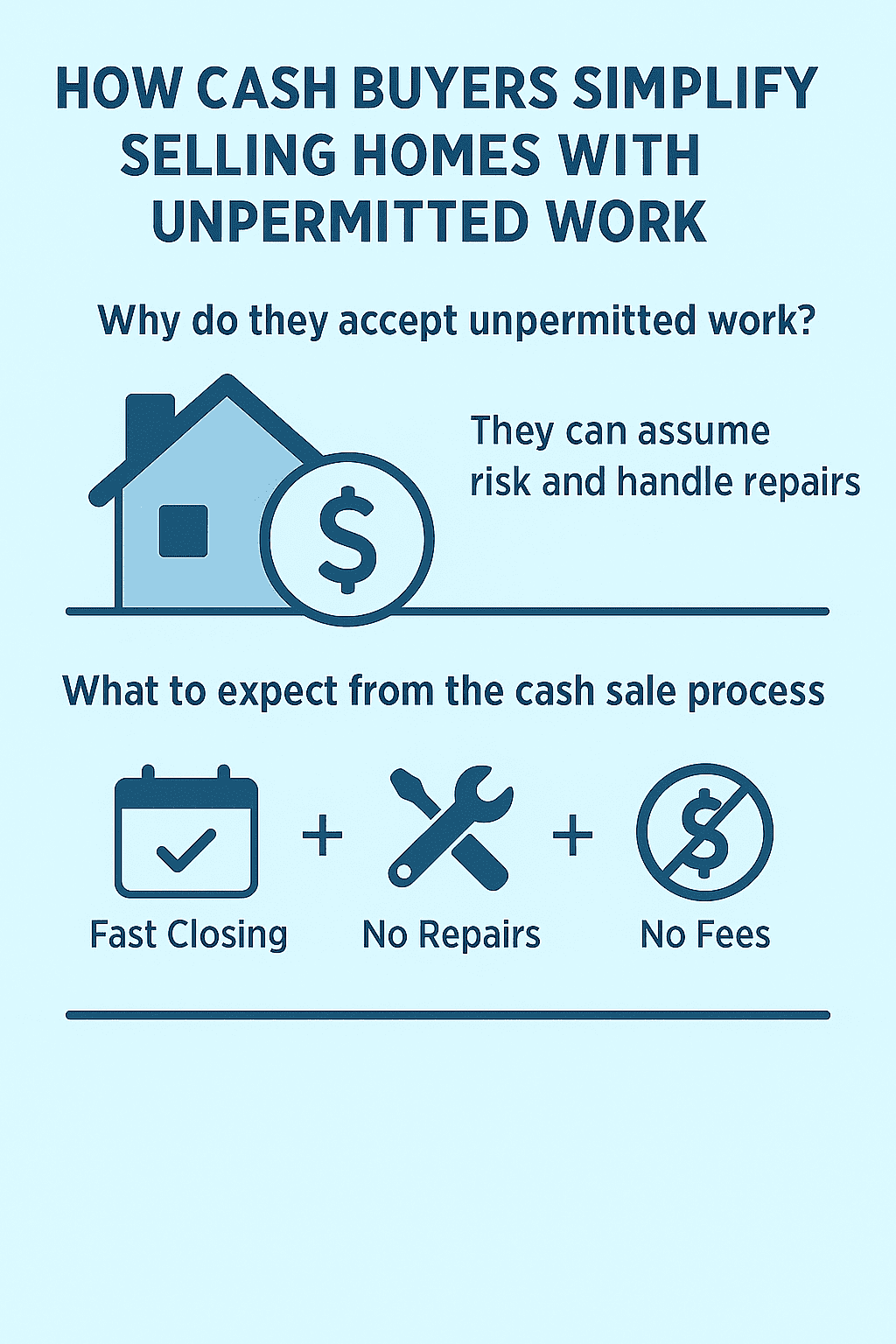Selling a house is already a big step. But when your home includes unpermitted work, it can feel overwhelming. You may be asking yourself: “Will anyone buy this?” or “Do I need to fix everything first?”
The good news is, you have options. At 48Acquisitions, we’ve helped many homeowners sell houses with unpermitted additions, converted garages, or DIY upgrades, all without jumping through legal hoops or paying for costly permits.
This guide will walk you through how to spot unpermitted work, what your choices are, and how to move forward with confidence. Whether you choose to fix the issue or sell your home as-is, there’s a path that works for you.
What Is Unpermitted Work and Why Does It Matter
Unpermitted work is any construction or renovation done on your property without the required approval from your local building department. That could mean a garage conversion, an added bathroom, or even electrical or plumbing work that wasn’t inspected and signed off.
While it’s common, especially in older homes or DIY projects, it can raise red flags when you try to sell.
Why does it matter?
- Legal responsibility stays with the homeowner. If a future buyer has problems, they could come back to you.
- It can impact your home’s value. Appraisers often discount the value of unpermitted additions.
- Buyers may walk away. Some lenders won’t finance homes with work that wasn’t legally approved.
The reality is, many homes have some level of unpermitted work. What matters is how you handle it during the selling process.
Common types of unpermitted work that homeowners overlook
You might be surprised at how often even simple upgrades require permits. Some of the most common include:
- Garage conversions into living space
- Room additions or bump-outs
- Finished basements
- Electrical rewiring or new panels
- Plumbing upgrades like new bathrooms or water heaters
- Installing HVAC units or ductwork
- Decks and patio covers
These projects may seem minor, especially if they were DIY or done by a prior owner. But without permits, they may not meet code , and that matters when you go to sell.
Why does some work go unpermitted
There are several reasons why homeowners skip the permit process:
- Cost concerns: Permits come with fees and inspection requirements.
- Time delays: Getting permits approved can slow down a project.
- Lack of awareness: Many people simply don’t know a permit is required.
- Previous owner shortcuts: The unpermitted work may have happened before you bought the home.
Whatever the reason, the result is the same, unpermitted work adds uncertainty for buyers, lenders, and inspectors.
Can You Legally Sell a House with Unpermitted Work?
Yes, you can legally sell a house even if it includes unpermitted work. The key is understanding the rules in your area and being transparent with buyers.
State laws and disclosure rules
Most states require homeowners to disclose known defects or unpermitted work when listing a property. This is typically done through a seller disclosure form.
Failing to disclose known unpermitted work may lead to disputes after closing. It’s important to understand your local disclosure requirements and consult a real estate attorney if you’re unsure.
That’s why it’s essential to:
- Understand your local disclosure laws
- Consult a real estate attorney or agent if unsure
- Never assume a buyer won’t find out
What buyers are entitled to know
Buyers typically expect full and honest information about a home’s condition, especially if they’re using financing. Being transparent can help build trust and avoid delays. If they’re financing the purchase, their lender or appraiser may flag unpermitted areas, especially if they affect square footage or safety.
Here’s what most buyers want to know:
- Was the work done by a licensed professional?
- Does the work meet current safety or building codes?
- Could the city force them to remove or fix it after closing?
By being upfront, you reduce the chances of a deal falling apart later and build trust with potential buyers.
How to Check If Your Home Has Unpermitted Work
If you’re unsure whether your property includes unpermitted additions or upgrades, you’re not alone. Many homeowners don’t realize certain changes require permits, especially if the work was done years ago or by a previous owner.
Compare your property to the original plans
Start by reviewing your home’s original blueprints or property records. If your current layout includes rooms or features that aren’t shown on those documents, that’s a clue.
Pay special attention to:
- Extra bedrooms or bathrooms
- Converted garages or basements
- Extended patios or enclosed porches
These changes should show up in your official records if they were legally permitted.
Search city or county permit records
You can request your home’s permit history from your local building department. Many cities now offer this online for free.
Look for:
- Permits issued for major work (remodels, additions, mechanical updates)
- Final inspection records
- Gaps in documentation where work may have been done without permits
If there’s no record of inspection or approval for something you know was added, it may be unpermitted.
When to call in a home inspector
If you still have doubts, a professional home inspector can assess your property and spot signs of work that doesn’t meet code or appears undocumented.
They’ll evaluate:
- Electrical panels and wiring
- Plumbing systems and water lines
- Structural modifications or add-ons
This step isn’t required, but it can give you peace of mind before listing your home.
Your Selling Options If There’s Unpermitted Work
Finding out your home has unpermitted work doesn’t mean you’re stuck. You still have multiple options, and each one depends on your goals, timeline, and budget.
Option 1: Sell your home as-is to a cash buyer
If you want to avoid permits, repairs, or delays, selling your home as-is is often the fastest solution. Cash buyers like 48Acquisitions are experienced with unpermitted properties and won’t require appraisals, financing, or inspections that could slow things down.
Benefits of selling as-is:
- No repairs or retroactive permits needed
- Close in as little as 7 days
- No real estate commissions or fees
- Less stress, more control over your timeline
This is the most common route for homeowners who need a clean break or are working under pressure, like relocating, inheriting a home, or facing foreclosure.
Ready to Sell Your House Fast?
If you’re ready to experience a fast, hassle-free home sale, contact 48Acquisitions today. Don’t delay – get cash for your house fast and move on to your next chapter with confidence.
Option 2: Get retroactive permits
If the work was done properly but just skipped permitting, you may be able to apply for permits after the fact. This is called “legalizing” or “permitting retroactively.”
It can be a smart option if:
- The work is recent and up to code
- You’re selling to a traditional buyer using financing
- You want to avoid a price reduction
However, this process can be slow and costly. In some areas, retroactive permitting may involve opening walls, updating systems, or modifying work to meet current code. It’s a good idea to check with your local building department or contractor to understand the requirements.
Option 3: Remove or correct the work
In some cases, like if the work is unsafe or could cause serious legal issues, you may choose to remove it or bring it into compliance before selling.
This could mean:
- Tearing down an unpermitted room addition
- Rewiring or replumbing a bathroom
- Restoring a converted garage to its original state
This route requires more time and investment, but may help you get a better price or avoid inspection issues during escrow.
Risks of Selling Without Permits – And How to Minimize Them
Selling a house with unpermitted work can create a few bumps in the road, but knowing the risks upfront gives you the power to manage them.
Reduced buyer interest or lower offers
Buyers often hesitate when they learn that a home includes unpermitted work. They may assume the renovations were done poorly or worry that future repairs could be costly. That uncertainty can lead to fewer offers or bids that are lower than expected. It might also mean a longer time on the market as buyers weigh their options or negotiate more aggressively. If you’re facing this kind of hesitation, selling to a cash buyer can be a more direct path. Cash buyers typically focus on the value of the home rather than whether permits were filed years ago.
Delays or legal liability after closing
If a buyer uncovers unpermitted work during an inspection, the deal can slow down or fall apart altogether. They might ask you to fix the issue, adjust the sale price, or delay closing while their lender evaluates the risk. Undisclosed unpermitted work may lead to complications after the sale. To avoid potential disputes, it’s recommended to be transparent and seek professional guidance if needed. That’s why full transparency from the beginning is key. Honest disclosure keeps the process smoother and protects you after the sale.
How Cash Buyers Can Make Selling Easier
Cash buyers offer a practical solution for homeowners facing the challenge of unpermitted work on their property. These buyers often specialize in purchasing homes as-is, which means they are comfortable accepting properties with unpermitted additions or renovations. They understand the risks involved and price their offers accordingly, taking into account any costs they might incur to bring the property up to code or to resolve permit issues after the sale.
Why cash buyers often accept unpermitted work
Cash buyers frequently accept unpermitted work because their purchase process does not depend on traditional financing or appraisals. Lenders and banks often require full disclosure and permits for renovations before approving a mortgage, but cash buyers bypass these hurdles. This flexibility allows them to make quick offers on homes that might be difficult or impossible to sell through traditional channels. Their business model accounts for the extra risk and potential costs, enabling them to provide fair cash offers that reflect the home’s condition without requiring you to fix or legalize unpermitted work before selling.
What to expect from the process
When selling to a cash buyer, the process is typically faster and simpler than a traditional sale. After you submit your property details, the buyer will evaluate the home’s condition, including any unpermitted work, and provide a fair cash offer usually within 24 to 48 hours. If you accept, the closing can often happen within a week or on a schedule that suits you. Throughout the process, you won’t need to worry about repairs, staging, or waiting for financing approval. The paperwork is usually straightforward, and there are no agent commissions or hidden fees. This streamlined approach reduces stress and gives you more control over when and how you sell your home.
Selling a House with Unpermitted Work Doesn’t Have to Be Stressful
Dealing with unpermitted work can feel overwhelming, but selling your home doesn’t have to add to your stress. The key is knowing your options and choosing the approach that fits your timeline and goals.
Choosing the right approach for your timeline
If you need to sell quickly, selling as-is to a cash buyer can get you a fast, fair offer without waiting on permits or repairs. For homeowners with more time, obtaining retroactive permits or making corrections can help you maximize your sale price. Understanding what fits your schedule and finances helps you avoid delays and surprises.
Letting go of repairs and red tape
Many homeowners worry about the cost and hassle of fixing unpermitted work before selling. While correcting these issues can improve value, it’s not always necessary. Working with experienced cash buyers or local experts lets you avoid complicated permitting processes and move forward with confidence, even if your home isn’t perfect.
Ready to Move On? Here’s How We Can Help
At 48Acquisitions, we understand how challenging selling a house with unpermitted work can be. Our team is here to provide you with a straightforward, stress-free solution tailored to your needs.
No-obligation offers, fast closings, and local experience
We offer no-obligation cash offers based on your home’s current condition, including any unpermitted work. You can select your closing date, whether you want to close in just a few days or need more time to plan your next move.
With deep local market knowledge, we ensure your cash offer is fair and competitive. We handle all paperwork and details so you don’t have to worry about permits, repairs, or hidden fees.
If you’re ready to sell your house quickly and without hassle, contact us today. We’re here to help you move forward with confidence.
Frequently Asked Questions
Can I sell a house without disclosing unpermitted work?
In many states, sellers are required to disclose known unpermitted work. If you’re unsure about your disclosure obligations, it’s best to speak with a licensed real estate professional or attorney in your area.
Will buyers care if my home has unpermitted work?
Some buyers may be hesitant or request repairs or price reductions. However, many cash buyers and investors are comfortable buying homes with unpermitted work, especially if you are upfront about it. Being honest and working with the right buyer can reduce stress and delays.
How much value will I lose if I sell as-is?
Selling as-is with unpermitted work usually means accepting a lower price than a fully permitted, move-in-ready home. The exact amount varies based on your local market and the type of work involved. However, the convenience and speed of an as-is sale often outweigh the cost of repairs or retroactive permits.





